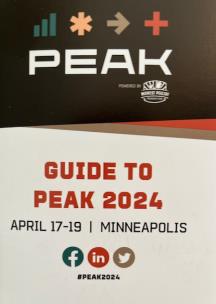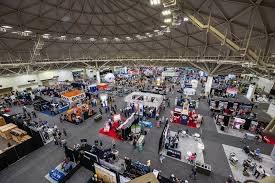 PEAK 2024 organized by the Midwest Poultry Federation is now well established in the Minneapolis Convention Center that provides more exhibition space, meeting rooms that the previous St. Paul Convention Center. The trade exhibition consistently attracts more turkey-related allied suppliers and contractors compared to the IPPE. The concurrent industry association meetings and educational programs are focused on turkey production given the concentration of farming operations in six Midwest states. A wide range of feeding, ventilation and drinking systems were displayed for floor systems suitable for turkeys and broilers. Technical personnel and representatives were available on booths to discuss operational parameters of equipment, vaccines and medication.
PEAK 2024 organized by the Midwest Poultry Federation is now well established in the Minneapolis Convention Center that provides more exhibition space, meeting rooms that the previous St. Paul Convention Center. The trade exhibition consistently attracts more turkey-related allied suppliers and contractors compared to the IPPE. The concurrent industry association meetings and educational programs are focused on turkey production given the concentration of farming operations in six Midwest states. A wide range of feeding, ventilation and drinking systems were displayed for floor systems suitable for turkeys and broilers. Technical personnel and representatives were available on booths to discuss operational parameters of equipment, vaccines and medication.
Educational programs presented included the North Central Avian Disease Conference, the Devenish Nutrition Symposium, and a number of informal gatherings, taking advantage of attendance at the event.

The Midwest Poultry Federation arranged a series of educational presentations for broiler and turkey management, feed technology and business leadership. Topics in the Broiler Track included pre-harvest Salmonella control; Biosecurity and innovations in brooding. The Turkey Track included suppression of pecking injuries, prevention of histomoniasis and advances in management procedures to enhance productivity.
During the trade exhibition, poultry TED Talks were presented detailing innovations in products and management for the benefit of attendees. Topics of interest in live-bird production included vaccination of turkeys against coccidiosis with the introduction of a trivalent Eimeria vaccine; transitioning to non-antibiotic programs, blood biomarkers to detect mycotoxicosis; assessing poult quality; and application of available probiotic feed additives.
Entertainment included PEAK Unhatched, an Exhibition-floor Happy Hour and Hospitality Night.
Despite the prevailing favorable margins in production, there were a number of overhangs that detracted from optimism:
- The resurgence of highly pathogenic avian influenza was a major issue of concern with four large egg-production complexes and one turkey farm diagnosed since the beginning of April. USDA-APHIS has depopulated close to eight million hens in three states, predominantly Michigan, Texas and a limited outbreak in New Mexico. A flock of 70,000 growing turkeys in Minnesota were depopulated. It is evident that HPAI is no longer limited to seasonal epornitics but has expanded beyond the period of migration of waterfowl in spring and fall months. This is in all probability due to transfer of the H5N1 virus to non-migratory species of free-living birds. This is evidenced by dead grackles and pigeons yielding H5N1 virus in the vicinity of the index dairy farm in Texas that was affected with Bovine Influenza-H5N1. Outbreaks of HPAI have been regularly diagnosed on a weekly basis in backyard flocks in widely separated states outside the migratory seasons. These small flocks serve as sentinels for the presence of avian influenza virus and many cases are not diagnosed. Sometime in 2024 the USDA-APHIS will have to accept regional vaccination for turkeys and egg-production flocks. It must be obvious by now that it is futile to attempt to eradicate an endemic infection spread by the aerosol route in addition to fomites.

- The impasse in Congress is impeding passage of legislation necessary to maintain agricultural production. The Farm Bill is mired in dissent in both the Senate and House Agricultural Committees with polarization separating left and right-leaning members. Ultimately there will have to be compromise on the two issues of contention represented by allocation of funds and expanded eligibility for SNAP and WIC favored by the left and diversion of funds from climate change programs to commodity price support on the right. The 118th Congress has barely passed fifty bills as opposed to an anticipated 400 in a normal two-year period. Appropriations bills were delayed by months with passage of stop-gap continuing resolutions avoiding Federal shutdowns. Both parties are to blame for their lack of commitment to the national interest caused by grandstanding and intra-party conflict.
- There are concerns over the soundness of the economy and consumer response. The Federal Reserve has successfully reduced inflation from 8.9 to 3.5 percent but is experiencing difficulty in reducing levels further to the target of 2.0 percent. International conflict and the price of energy are adding to the burden of inflation that is reducing consumer spending despite the last hurrah of extravagance during the first quarter of 2024.
 As in all planting seasons, there is concern over the anticipated crop. Yields will be influenced by the projected cyclic transition from an El Nino event through a brief neutral period and the return of a La Nina weather pattern during the late-2024 growing season.
As in all planting seasons, there is concern over the anticipated crop. Yields will be influenced by the projected cyclic transition from an El Nino event through a brief neutral period and the return of a La Nina weather pattern during the late-2024 growing season.
It is hoped that the contributions from PEAK 2024 in the form of technical and trade information will be transferred from the event to all U.S. production units and companies with evident improvements in productivity and profitability.